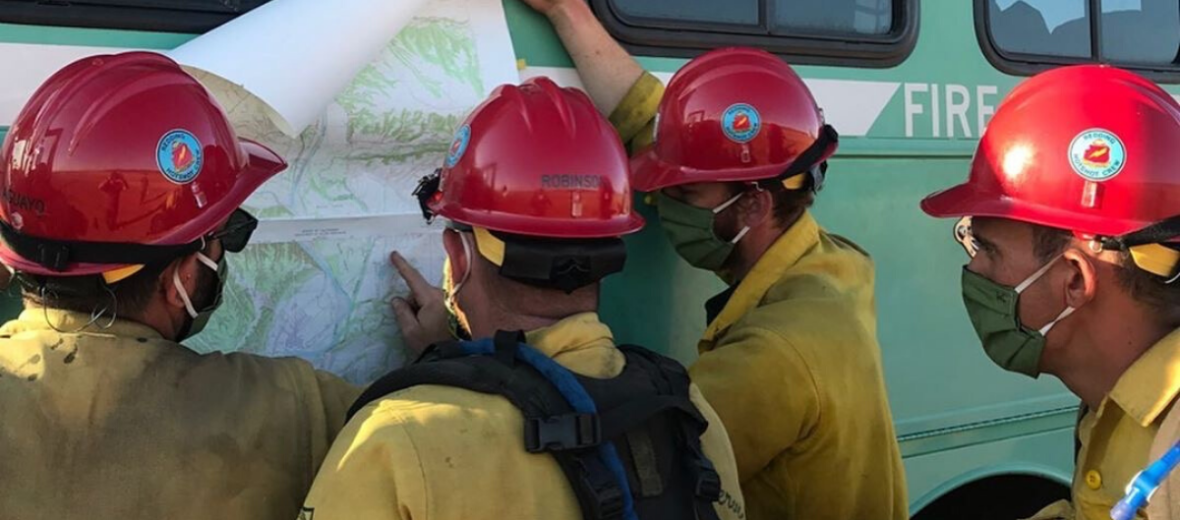
During the 17 June webinar, we had a brief discussion on wildland fire management considerations under COVID-19, highlighting the briefing papers that Dr. Peter Moore, Dr. Cathelijne Stoof, Bethany Hannah and others co-authored. Please see below for the abstracts and links to those papers.
Wildland fire management under COVID-19. Brief 1, review of materials
Peter Moore, Bethany Hannah, Jasper de Vries, Marijn Poortvliet, Ron Steffens, Cathelijne R. Stoof
Abstract
COVID-19 will have major implications for wildland fire management, because of severe social distancing and hygiene requirements. We collected procedures and guidance created around the world to help prepare wildland fire professionals globally for fire management during this pandemic. We did this by reviewing materials and sending out a survey to the fire community. We publish our findings in three ways. This Brief summarizes the materials reviewed and to give initial considerations and guidelines for the global wildland fire community. A follow up Brief will discuss the results of the survey, which will remain open until 15 May 2020 (link). Finally, results will be submitted to an academic journal for rapid publication. By using existing groups and networks to discuss this issue, obtain input and collate ideas, it will be possible to more quickly establish the principles and options for adapting to the constraints and opportunities that COVID-19 is imposing. All materials will be available free of charge for use by developed and developing countries, to facilitate learning and collaboration amongst individuals, agencies, and countries.
| Original language | English |
|---|---|
| Place of Publication | Wageningen |
| Publisher | Wageningen University |
| Number of pages | 13 |
| Publication status | Published – 2020 |
Click here to access the document
Preview Brief 2: Wildland Fire Management under COVID-19, Survey Results
Cathelijne R. Stoof, Jasper R. de Vries, Marijn Poortvliet, Bethany Hannah, Ron Steffens, Peter Moore
Abstract
Wildland fire management is impacted by COVID-19 as a result of strict hygiene and social distancing requirements. Here, we give a preview of the of our online survey (link) that aimed to clarify implications of COVID-19 restrictions on wildland fire management, map current thinking, and collate any plans, protocols or procedures to generate generic guidance for wildland fire professionals. The survey was completed by 443 individuals from over 38 countries, working at a large variety of organizations in terms of organization type, level of jurisdiction, primary function, and the size of the fire management and fire suppression work force. This preview includes the most important preliminary results. In short, the data indicates that people are worried about the effect of COVID-19 on wildland fire management and also expect this to impede management. Despite this, there is high confidence that operations can be continued during the pandemic. COVID-19 hygiene and distancing requirements are being widely adopted, which is being reflected by a reduced number of staff per vehicle. There is an expected reduction in support services being available. Notable to mention is furthermore the expected reduction in sharing and receiving of resources (from and to other countries, regions) in times of need. Finally, training and risk reduction activities are also impacted, suggesting a longer-term impact of the pandemic on fire management. Two main concerns highlighted by survey respondents are the lack of preventive COVID-19 testing amongst wildland fire fighters, and the increased risk of vehicle accidents if staff is spread across more vehicles. We are now analyzing the wealth of responses including over 30.000 words of comments shared, and plan to publish the full analysis mid June
| Original language | English |
|---|---|
| Place of Publication | Wageningen |
| Publisher | Wageningen University |
| Number of pages | 8 |
| Publication status | Published – 2020 |
Click here to access the document
*Photo credit: Redding Interagency Hotshot Crew; USA




Leave a Reply